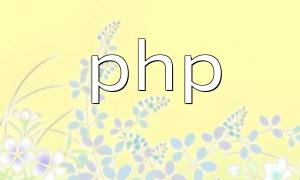PHP is a widely used server-side scripting language, mainly used for web development. When developing with PHP, developers often encounter the question of whether only the 64-bit version is available. This article will explain the 32-bit and 64-bit versions of PHP in detail, helping developers make an informed choice based on their specific needs.
PHP is not limited to any specific system architecture and can run on multiple operating system platforms, including both 32-bit and 64-bit systems. Whether it's Windows, Linux, or MacOS, PHP offers both versions to choose from based on the user's requirements.
On Windows, developers can choose between 32-bit or 64-bit PHP based on their needs. If you're using a 32-bit Windows operating system, it's recommended to install the 32-bit version of PHP. For a 64-bit Windows system, the 64-bit version of PHP is preferred.
On Linux, you can also choose between 32-bit or 64-bit PHP versions. Most Linux distributions offer both versions of PHP, and users can select the one that fits their system architecture requirements.
MacOS supports both 32-bit and 64-bit versions of PHP. Similar to Linux, users can choose the version that matches their system architecture.
If you need to determine whether your current PHP version is 32-bit or 64-bit, you can use the following simple code:
<?php
var_dump(PHP_INT_SIZE === 8); // Returns true for 64-bit, false for 32-bit
?>This code checks the value of `PHP_INT_SIZE` to determine whether the current PHP version is 32-bit or 64-bit. If it returns true, the PHP version is 64-bit; if false, it is 32-bit.
Performance is another important factor when choosing a PHP version. In general, the 64-bit version of PHP may have a slight performance disadvantage compared to the 32-bit version. This is because the 64-bit version needs to handle larger memory address spaces, which can result in higher memory usage in some scenarios. For applications that need to handle large datasets, selecting the right PHP version for your needs is essential.
Most PHP extensions are available in both 32-bit and 64-bit versions. Generally, extensions designed for 32-bit PHP will work on 64-bit PHP, but the reverse may not always be true. When using PHP extensions, it's important to choose the correct version to avoid errors or performance issues.
In conclusion, PHP does not only have a 64-bit version; it also supports the 32-bit version. When selecting the PHP version, developers need to consider factors such as system architecture, performance, and extension compatibility. Choosing the right PHP version can help you better meet your development needs.









